Crescent Sustainability Initiatives
Quality Education (SDG 4)
Lifelong Learning Measures at B.S. Abdur Rahman Crescent Institute of Science and Technology
Commitment to Lifelong Learning
B.S. Abdur Rahman Crescent Institute of Science and Technology (BSACIST) has demonstrated a strong commitment to promoting lifelong learning by ensuring that educational resources are accessible to all individuals, regardless of their background. This initiative aligns with the university’s mission to foster an inclusive educational environment that supports continuous learning and community engagement.
Free Access to Educational Resources – Special Coaching Programs for Higher Secondary Students
In February 2023, BSACIST organized a Special Coaching Program aimed at Higher Secondary School students, providing them with free access to educational resources. This program, which ran from February 13 to 20, involved participation from several local schools, including Crescent Boys Higher Secondary School and Nagore Crescent Matriculation Girls Higher Secondary School. The coaching sessions were tailored to the specific subjects and topics requested by the schools, and were conducted in a hybrid format, combining on-site and online classes to accommodate students from various locations.
Free Courses Leading to Certificate – Workshops on Corrosion Management
In addition to the coaching program, the Department of Civil Engineering hosted a two-day workshop on electrochemical corrosion techniques on March 17-18, 2023. This workshop was designed to educate participants, including postgraduate students and industry professionals, about the critical issue of corrosion, which poses significant economic challenges globally. The hands-on training provided participants with practical skills and knowledge, further promoting lifelong learning within the community.
Free access to Campus Facilities – Crescent Legal Aid Cell
The Crescent Legal Aid Cell, operating under the Crescent School of Law, exemplifies the university’s dedication to social justice and community empowerment. By providing free legal assistance and resources to local community members, the cell fosters legal awareness and promotes access to justice. This initiative highlights the university’s role as a community hub, bridging the gap between academic resources and public needs.
Free access to Online Resources – Open Access to Educational Resources
BSACIST is committed to providing free access to educational materials for individuals not enrolled at the university. This initiative includes access to libraries, digital resources, and online courses, ensuring that anyone interested in learning can benefit from the university’s offerings. The institution has developed a wealth of educational content, including video lectures and course materials, which are available to the public, thereby enhancing lifelong learning opportunities for all.
Crescent Institute of Science and Technology has organized Special Coaching Program for the Higher Secondary School Students during 13 – 20 February 2023.
The following Schools have been participated.
- Crescent Boys Higher Secondary School, Vandalur, Chennai
- Nagore Crescent Matriculation Girls Higher Secondary School, Nagore
- Pearl Matriculation Higher Secondary School, Kilakarai
- Shamrock Matriculation Higher Secondary School, Chennai
- School of Islamic Studies, Vandalur, Chennai
The subjects and the topics for the special coaching have been obtained from the Schools. Accordingly, the classes have been arranged for the above mentioned Schools. This special coaching program has been designed in hybrid mode, classes at Vandalur School have been taken on-site and the classes for the outstation Schools have been conducted online (Zoom Online Platform).
The subjects and the topics for the special coaching have been obtained from the Schools. Accordingly, the classes have been arranged for the above mentioned Schools. This special coaching program has been designed in hybrid mode, classes at Vandalur School have been taken on-site and the classes for the outstation Schools have been conducted online (Zoom Online Platform).
Inauguration of Off-Line Classes (13.02.2023)
The special coaching program has been started at BSACIST, Vandalur with a brief inauguration.

Figure IV (3.1) – 1: Inauguration of Special Coaching Class for Higher Secondary School
The following faculties have participated.
Dr. P. Sheik Abdul Khader, Senior Professor,CA – BSACIST
Mr. Abraham John, Principal, Crescent Boys Higher Secondary School
Dr. P. Panneerselvam,University Librarian – BSACIST
Dr. N. Kogila, AP/Commerce – BSACIST
Dr. R. Amiruddin, AP/Physics – BSACIST
Dr. B. Subramani, Vice Principal, Crescent Boys Higher Secondary School
Mrs. Asha Dhoulath, Vice Principal, Crescent Boys Higher Secondary School
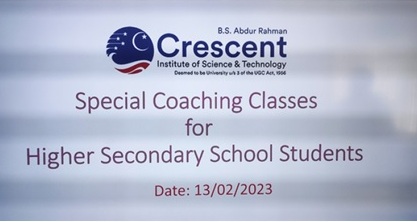
Figure IV (3.1) – 2: Inauguration of Special Coaching Class
Dr. P. Sheik Abdul Khader welcomed the dignitaries and the students, he briefed about the program design and the importance of conducting coaching classes on the required topics. He has informed the students on how to prepare for the exams and the various techniques to adapt to face the exams successfully.
Mr. Abraham John, the Principal has thanked the BSACIST for organizing the special coaching on various subjects. He has asked all the Students to actively participate and interact with the faculties to clear their doubts.
The first day class was handed by Dr. R. Amiruddin on Electromagnet induction and alternating current for the Science stream students. Dr. N. Kogila has taken class on Financial markets and Stock exchange for the Commerce group students.
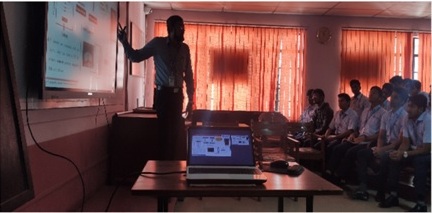
Figure IV (3.1) – 3: The first day class by Dr. R. Amiruddin on Electromagnet induction and alternating current for the Science
Online Classes
The Online Classes were started on 14.02.2023 through Zoom link. Dr. P. Sheik Abdul Khader, Senior Professor has welcomed the gathering. He has explained the importance of the program and communicated with the Students on how to overcome the exam fear and asked them to interact with the Faculty to clear the doubts.
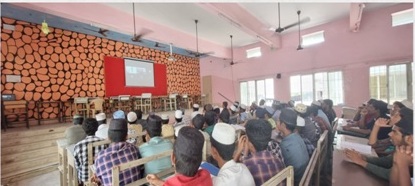
Figure IV (3.1) – 4: The Online Class by P. Sheik Abdul Khader, briefed about the program design and the importance of conducting coaching classes on the required topics.
The following Schools have participated in Online Classes.
- Nagore Crescent Matriculation Girls Higher Secondary School, Nagore,
- Pearl Matriculation Higher Secondary School – Kilakarai,
- Shamrock Matriculation Higher Secondary School, Chennai
- School of Islamic Studies, Vandalur, Chennai.
Prior to the program, a demo was conducted on 10.02.2023 to check the feasibility of conducting the classes through online. This demo was helpful for the Schools to prepare themselves for the Online classes.
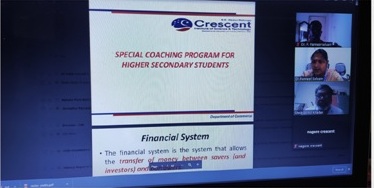
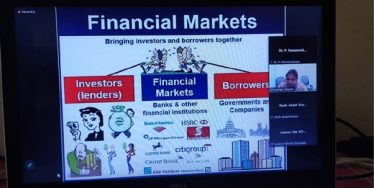
Figure IV (3.1) – 5: The Online Class by Dr. N. Kogila has taken class on financial markets and Stock exchange for the Commerce group students.
Feedback from the School Students
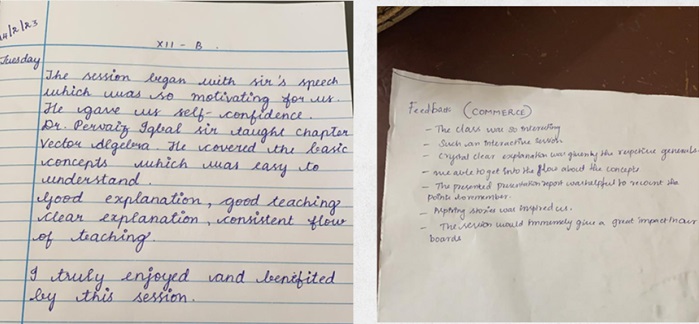
Figure IV (3.1) – 6: Feedback from the School Students
March 17-18, 2023
Jointly Organized by
Department of Civil Engineering & Department of Chemistry
B.S. Abdur Rahman Crescent Institute of Science and Technology

The Department of Civil Engineering has made significant strides in promoting lifelong learning and providing free access to educational resources in 2023. Recognizing the critical issue of corrosion, which incurs an annual cost of $2.5 trillion globally and significantly impacts economies, the department has initiated various programs aimed at educating both students and the broader community. These initiatives are designed to raise awareness about corrosion’s detrimental effects on infrastructure and the economy, while also equipping individuals with the knowledge and skills necessary to address this universal problem.
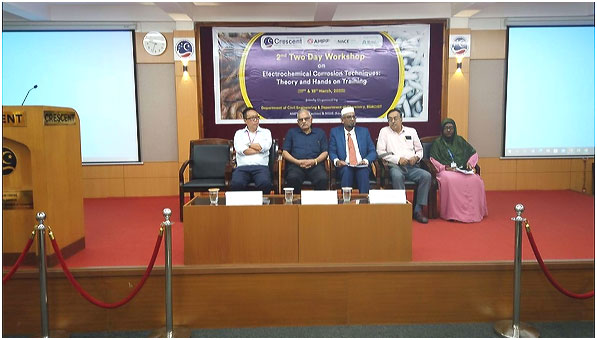
Figure IV (3.1) – 7: Photo taken during the inauguration
One of the key highlights of this year’s efforts was the organization of a two-day workshop focused on electrochemical corrosion and its control techniques. This workshop served as a platform for participants, including postgraduate students, research scholars, and industry professionals, to gain insights into the latest advancements in corrosion management. Emphasizing hands-on experience, the workshop provided opportunities for attendees to engage with modern instruments and learn practical data acquisition techniques. This approach not only enhanced participants’ understanding of corrosion but also fostered a collaborative learning environment.
In addition to the workshop, the department has committed to making educational materials freely accessible to individuals not currently enrolled at the university. This initiative aims to promote a culture of lifelong learning and ensure that valuable knowledge is available to all, regardless of their academic status. By providing open access to resources such as lecture notes, research papers, and recorded sessions, the department is actively contributing to the educational landscape and empowering individuals to further their understanding of civil engineering principles.
Overall, the Department of Civil Engineering’s initiatives in 2023 reflect a strong commitment to lifelong learning and community engagement. By addressing the pressing issue of corrosion through educational outreach and resource accessibility, the department is not only enhancing the skill sets of individuals but also contributing to the broader goal of sustainable development. These efforts align with the objectives of Sustainable Development Goal 4, ensuring that quality education is accessible to all and fostering a culture of continuous learning in the community.
DAY 1 : 17.03.2023 – Session 1 – Basics of Corrosion and its Forms
Dr. A. Poonguzhali presented on the topic “Basics of Corrosion and its forms” which gave a clear understanding about types of corrosion, factors influencing corrosion, prevention and control of corrosion. She started the presentation with the inputs on major impact of corrosion on industries and economic sectors.
She stated that thermodynamically corrosion can never be prevented. She then discussed about the interdisciplinary nature of corrosion and their synergistic influence of various parameters of material, environment and their interfaces playing a key role in the failure of components due to corrosion.
She then explained the various types of corrosion, electrochemical nature of corrosion with relevant chemical equations.
She then highlighted the various factors influencing corrosion, which includes
- Solution pH
- Oxidizing agent
- Temperature
- Velocity
- Surface films
Further, she discussed about various types of corrosion in detail and their prevention and control measures. To list a few, Galvanic corrosion, Dealloying / selective leaching, Graphite corrosion, Localized corrosion, Pitting corrosion, Crevice corrosion, Filiform corrosion, Erosion corrosion, Cavitation corrosion, microbiologically induced corrosion, High temperature corrosion etc.,
Later, she concluded the presentation with various measures to control corrosion, which includes
- Selection of proper material
- Proper design of equipment
- Altering environment
- Cathodic protection
- Sacrificial anode method
- Anodic protection
DAY 1 : 17.03.2023 – Session 2 – Basics of Electrochemistry, Testing & Monitoring
Dr. S. Rangarajan gave a lecture on the topic “Basics of Electrochemistry, Corrosion Testing and Monitoring”. He had begun the presentation with the basics of electrochemistry which gave an adequate input on metal/solution and solution/solution interfaces. He then discussed the electrode potential measurement along with Electromotive Series of metals, Effect of concentration on electrode potentials: The Nernst equation for better understanding. He stated Faraday’s first and second law of electrolysis.
He explained the various corrosion testing techniques with many illustrations.In LPR method, the two electrode and three electrode system were discussed. LPR method is very quick, direct reading and recording of corrosion rate is possible. But it can only be used to liquids that conduct electricity. He then talked about Tafel Extrapolation method and its limitations. He introduced Electrochemical Impedance Spectroscopy which uses sinusoidal voltage and current perturbations to study electrode processes at equilibrium conditions by understanding electrochemical relaxation phenomena with varying orders of magnitude of frequency from 10-4 Hz to 80 MHz.
Further he described the electrochemical noise analysis and its application in Pit inhibition, SCC crack propagation, MIC in buried pipelines, inhibitor evaluation, weld corrosion, biocide efficacy etc.
He then talked about the mostly widely used method for measuring material loss occurring in the interior of plant and pipelines which is Electrical Resistance Monitoring where it utilizes an ER probe comprises of a sensing element, as a loop material made from wire or strip which is used to conduct an electrical signal.
Later, he concluded the session by suggesting books for future references. Few books he cited are list below:
- Mars G. Fontana, “Corrosion Engineering”, third edition, Mc Graw hill lnc.,1987
- ASM handbook – Vol 13: Corrosion, ASM International,2001
DAY 1 : 17.03.2023 – Session 3 – Advanced Electrochemical Techniques
Dr. S. Ningshen, started the session with his lecture on the topic “Advanced Electrochemical Techniques for Corrosion Monitoring”. He emphasized on the significance of corrosion monitoring techniques in combating corrosion, which can have major economic and safety implications. He discussed the statistics of global cost of corrosion which is estimated to be US$2.5 trillion which could be minimized by 15 to 35% of the cost of corrosion if available corrosion control practices are utilized properly. He addressed some of the infamous corrosion catastrophes like Aloha Airlines Flight-243 incident, Silver bridge collapse, Erika sinking etc., which should be known to avoid in future with proper corrosion monitoring.
He stated that corrosion monitoring is the practice of acquiring information on the progress of corrosion-induced damage to material. He also highlighted the several other benefits of corrosion monitoring techniques like
- To inspect and predict the corrosion damage level of structures
- To obtain information on the state of equipment by providing an early detection to the damaging process.
- To improve operational reliability of new and/or modified plants and processes.
Further he discussed the corrosion testing methods which was classified into three major types. They are: 1.Laboratory tests, 2. Field tests 3. Service tests.
He then discussed the Standard of corrosion testing methods and their types like ASTM, NACE, SSPC, API, AWS, SO etc., for corrosion testing. He gave a detailed talk on Electrochemical noise (ECN) for corrosion monitoring, Field corrosion detection of nuclear materials using ECN, EN-based corrosion monitoring system, their advantages and disadvantages. Lastly, he gave inputs on future developments, such as wireless, intelligent and automatic electrochemical measurement, that will augment the present electrochemical methods of evaluating corrosion degradation.
DAY 1 : 17.03.2023 – SESSION 4
Hands on Training – Chemistry and Civil Engg. Department Laboratories.
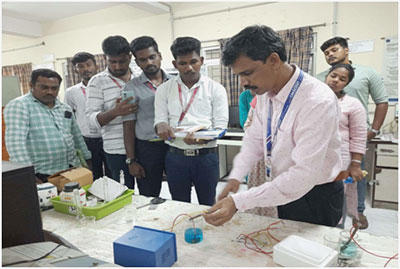
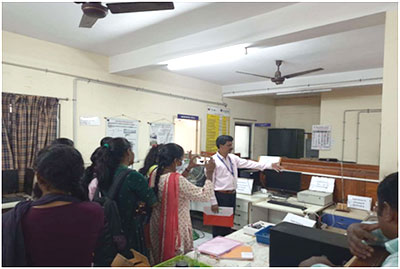
Figure IV (3.1) – 8: Hands on Training – Chemistry and Civil Engg. Department Laboratories.
DAY 2 : 18.03.2023 – Session 1 – Cathodic Protection: Galvanization vs Sacrificial Anodes
Dr. M.S. Haji Sheik Mohammed presented on the topic “Cathodic Protection: Galvanization Vs Sacrificial Anode”. He started the lecture with the various infrastructure developments in India and the budget allocated by the Government of India. He emphasized the balanced approach needed to enhance the durability and service of buildings. The major consequences of corrosionlike reduction in original diameter, cracking, rust stains were also discussed. He discussed the major causes and types of corrosion in concrete structures which includes carbonation-induced corrosion, chloride- induced corrosion.
He then explained about the Galvanized steel rebars and its mechanism of corrosion resistance. The two manufacturing procedures are Hot Dip Galvanization and Continuous Galvanization. The advantages of galvanized rebars are
- Uniform thickness
- Sacrificial protection to steel
- Bond strength development
Further he highlighted various performance evaluation tests like Chemical resistance test, applied voltage test, Open circuit potential test and so on indetail. He introduced the Sacrificial Anode Cathodic Protection with its advantages and disadvantages. Anode galvanically protects surrounding rebar. He talked about the performance of SACP system against stimulated marine exposurewith its experimental procedure. Later he has mentioned various research findings on galvanized rebars like
- Excellent chemical resistance in 3M CaCl2, Sat.Ca (OH) 2 and distilled water medium.
- Impact & adhesion test results satisfy the codal requirements
Finally, he concluded with some inputs on major constraints in the application of SACP system.
DAY 2 : 18.03.2023 – Session 2 – Corrosion inhibitors and its application
Dr. S. Kutti Rani started the presentation with the quote of Ratan Tata which was stated as, “None can destroy iron but its own rust can. Likewise, none can destroy a person but his own mindset can”. She presented on the topic “Corrosion inhibitors and its application”. She discussed about the basics of corrosion and the factors influencing corrosion. She also discussed some facts about corrosion like
- Corrosion is a natural process
- It is the reverse of metal extraction
- It is an electrochemical process
She highlighted the economic impact of corrosion in India. According to National Association of Corrosion Engineers (NACE), the annual loss of corrosion is estimated to be 3 to 5 % of GDP.
She explained about the inhibitors and their role in corrosion control. Inhibitoris a substance which effectively decreases the corrosion rate of a metal when added in small amount to the corrosive environment. Different types of inhibitors are: Anodic inhibitors, cathodic inhibitors, Inorganic inhibitors and Organic inhibitors.
She spoke about the criteria for inhibitor selection where the solubility of the inhibitor in water or alcohol is an important factor. The solvent in which the inhibitor is applied should be expensive, non-toxic and non-hazardous. Among the alternative corrosion inhibitors, organic products containing one or more polar functions (with N,O and S atoms) have shown to be quite efficient to prevent corrosion, as well as heterocyclic compounds containing polar groups and pi-electrons.
Finally, she discussed about the application of nanomaterial in corrosion protection inhibitors and coatings. The difference between nano-coating and conventional coating were also discussed. The extract of naturally occurring substances such as seeds, peels, fruits of some plants proved a good inhibition efficiency for metal corrosion in various media.
DAY 2 : 18.03.2023 – Session 3 – Electronically conductive coatings for corrosion protection
The presentation on “Electronically conductive coatings for corrosion protection” was given by Mr. Raman Vedarajan which gave a wide understanding on polymer electrolyte membrane fuel-cells. He started the presentation with the input of various centres at ARCI which work on coatings like Centre for Carbon Materials (CCM), Centre for Nanomaterials (CNM),and Centre for Solar Energy Materials (CSEM) and so on.
He then highlighted the key applications requiring conductive protection like artificial skin, solar cell, supercapacitor, drug delivery and battery. He gave a detailed lecture on Polymer Electrolyte Membrane Fuel Cell, its component, functions, design and manufacture. For full market implementation of PEM fuel cells to become a reality, two main limiting technical issues must be overcome – cost and durability. Further, he discussed the electrochemical corrosion of carbon in PEMFC and its limitations. He explained about the bipolar plate durability and challenges and conductive coatings on metallic bipolar plate.
He then talked about carbon coatings which is a suitable surface modification process that have been tried. In amorphous carbon coating, the composite coating is stable, corrosion resistant and adherent under both cathodic and anodic environments of the fuel cell.
He then mentioned about the oxynitrides which are of special interest in energy conversion and storage techniques. CrON an electrocatalyst for OER reaction.He illustrated the experimental setup of oxynitrides with relevant chemical equations.
He concluded the lecture with the inputs of current project work of Chromium nitride and titanium nitride utilized coatings.
DAY 2 : 18.03.2023 – Session 4 – Electrochemical Impedance Spectroscopy – An Introduction
The final lecture was delivered by Dr. S. Ramanathan on the topic “Electrochemical Impedance Spectroscopy – An Introduction”. He started the presentation by discussing the basics of electrochemistry which included the components of Electrode Electrolyte Interface with pictorial representation.
He then highlighted the Electrochemical Techniques like
DC – Potential, Current, Time
- Linear Polarization
- Chrono amperometry, Chrono potentiometry
- Cyclic voltammetry
AC Technique
- Impedance Spectroscopy
- AC Voltammetry
He gave a detailed lecture on Electrochemical Impedance Spectroscopy about its principle, components, working and impedance calculation. He thenmentioned about data acquisition in EIS, its instrumentation in particular about their frequency range.
Further Dr. S. Ramanathan, explained about data representation using anexample circuit and its graphical representation and gave few more inputs ondata analysis. The important parameter in corrosion is Polarization Resistance (RP) which influences the low frequency limit of faradaic impedance.
He talked about the pitfalls of EIS – Data analysis. Some of the pitfalls are:
- If time constants are close to each other, we cannot distinguish them easily.
- A circuit fitting program can be used – A circuit with one time constant willnot fit the data. We will need two-time constants to model the data.
He then discussed the pros and cons of EEC. He concluded the presentation stating that EIS alone is not sufficient to identify the process. It can help eliminate some possibilities and narrow down the choices. To obtain clear insights, often we need to analyse in combination with other techniques (XPS, Potentiodynamic polarization)
Hands on Training – Chemistry and Civil Engg. Department Laboratories
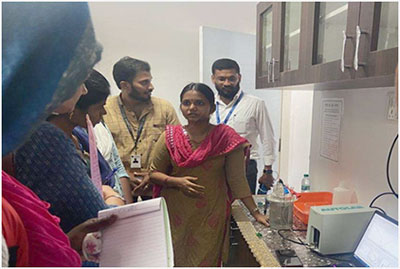
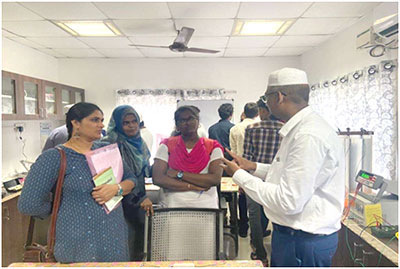
Figure IV (3.1) – 9: Hands on Training – Chemistry and Civil Engg. Department Laboratories
Crescent Legal Aid Cell
“Empowering Communities, Ensuring Justice”
Crescent Legal Aid Cell believe in the transformative power of Legal Aid, operating under the esteemed Crescent School of Law, B. S. Abdur Rahman Crescent Institute of Science & Technology, Chennai. We are committed to social justice, providing accessible legal assistance, fostering awareness, and making a positive impact in the lives of individuals and communities in need.
Crescent Legal Aid Cell serves as a beacon of hope, bridging the gap between justice and those in need. Our dedicated team of passionate faculty members, skilled lawyers, and compassionate student volunteers works tirelessly to ensure that justice is not a privilege, but a right for all. With a focus on promoting social justice, we strive to empower individuals and create a more equitable society.
This legal awareness programme exemplifies Crescent School of Law’s commitment to promoting legal knowledge and community involvement, demonstrating the institution’s dedication to providing open access to educational resources and facilities to the wider community. The law school’s campus facilities, including its moot court hall, legal aid clinic, and library resources, were made freely accessible to local community members during this initiative, breaking down barriers between academic institutions and the public.
The proactive measures taken by the students in preparing and disseminating educational materials significantly enhanced the outreach of the programme, while utilizing the institution’s state-of-the-art facilities. The law school’s commitment to public engagement is evident through its policy of opening campus spaces for community learning, including providing access to:
- Legal databases and digital resources
- Conference facilities for public workshops
- Library services for community research
- Meeting rooms for legal consultations
- Computer laboratories for digital literacy
By empowering the local community with knowledge, resources, and unrestricted access to campus facilities, this initiative marks a successful effort in fostering a culture of vigilance and legal awareness. The programme showcases how educational institutions can serve as community hubs, making their facilities and expertise available to the public, thereby contributing to lifelong learning opportunities and educational equity.
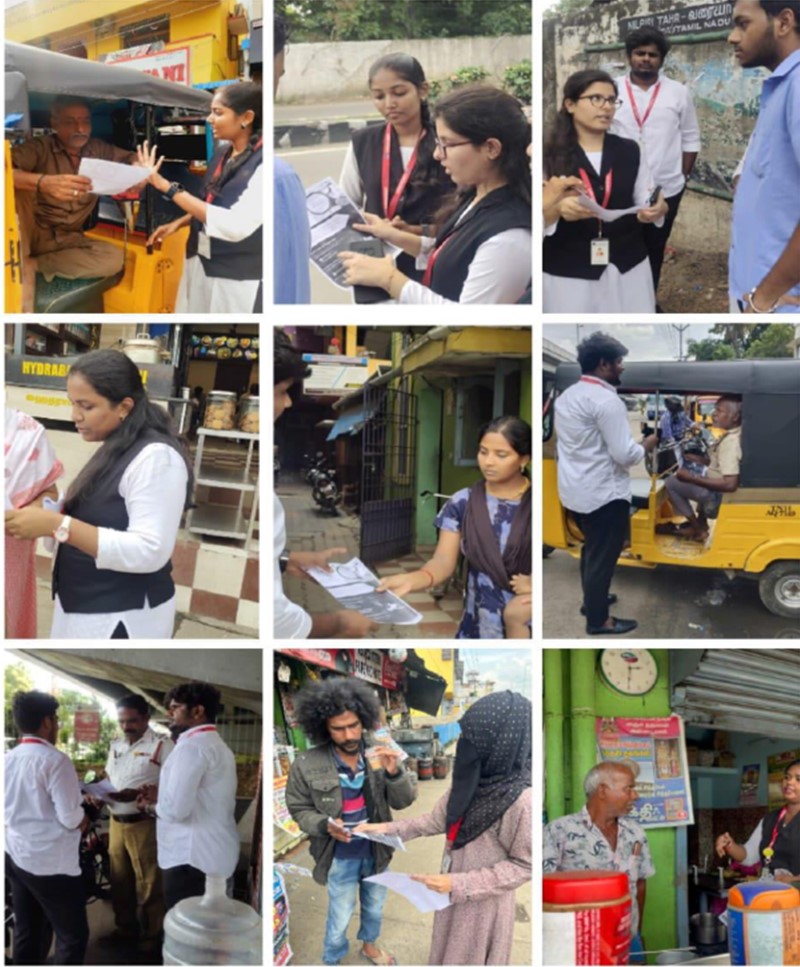
Figure IV (3.1) –10: Engaging with the community: Law students educating on Legal Awareness
To ensure that access to various facilities, resources, and activities is accessible to all (Faculty, staff, students, alumni and public) regardless of ethnicity, religion, disability, immigration status or gender. To start Libraries/Digital Libraries and reading rooms for the use of the Public in general. These objectives were extracted from the Memorandum of Association of the sponsoring body of the Institution and the Rules and Regulations of the statutory body implemented by the Institution. The University takes great pride in making the world know that the resources of the University can be used even by persons who are not studying on campus. The facility is open to all irrespective of any discrimination. Therefore, the University envisages the promotion of not only its students but whoever is interested in educating themselves. The aim is precisely, the welfare of society as a whole. For the same reason, it provides huge access not alone to the library but also to the online courses, video lecture materials and other facilities which students/the public want to access. Any student who is endowed with intellectual ability is promoted and encouraged to navigate his skills and achieve great success. The University has been organizing events in the public domain by conducting public lectures, various events, and educational events and ensure maximum public participation. The University also offers vocational training to the public, free of cost and this has enabled many persons to secure jobs and earn their livelihood. Many families are benefitted from this and in this way the University ensures that it is always in the service of the community. The various departments of the University have also organized many extension activities beyond the campus which has benefitted the students in the nearby schools, the people of small hamlets in the vicinity of the University, the small towns and the city areas which is appreciated by the people who are the beneficiaries of such activities. Last but not the least, the University takes pride in providing access to education to all, those who seek knowledge and wisdom, regardless of their ethnicity, religion, community gender or disability. This was the vision and mission envisaged by its founders.
There are a total of about 190 video lectures, 53 PPTs & 68 pdf files developed for different courses by our faculty members of all the departments.
These lectures are available for public access to enhance life-long learning skills.
Public users can access the course materials through the URLs of the respective department e-learning portal as given below.
School of Mechanical Sciences:
School of Infrastructure:
School of Social Sciences and Humanities:
Crescent School of Pharmacy:
School of Physical and Chemical Science:
Crescent School of Business:
School of Electrical and Communication Sciences:
School of Computer Information and Mathematical Sciences:
School of Life Sciences:
Others:
Library Public Resources
Click here to view the Website
eBooks
The revolution, which took place in information and communication technology (ICT) has made a paradigm shift in the route to access library & information centres. Realizing the importance of e-access and its advantages, the library has shifted its focus towards open access as well paid subscription to e-Books.- National Digital Library of India
- PDF Drive
- Pharmacy
- Engineering – Bookboon
- Engineering – Free-Ebooks.net
- Business & Investing
- Computers Science & Internet
- Directory of Open access Books
- e-Book Lobby containing collection of various subjects.
- Engineering & Technology – Semrush
- Free Online Computer Science & programming Books – Welcome To Freetech Books
- Free Computer Books – Free Technical Publication
- Get Free EBooks
- Globusz is a unique e-Publishing house, specializing in free e-Book downloads
- Gutenberg- more than 20,000 public domain books that are out of copyright and also world’s greatest fiction available.
- Health, Mind & Body
- History
- Humanities
- Law
- Literature & Fiction
- Many Books provides more than 20,000 e-books in various subjects
- Mathematics
- Medical Science
- Nonfiction
- Online Books for children – Big Universe
- Online Computer Books contains details about free computer books
- Online Free E-Books provides various subject e-books
- Open Book Publishers – Publishing open access academic books in the humanities and social sciences.
- Outdoors & Nature
- Pure Science
- Religion & Spirituality
- Scribed, the online document sharing site which supports Word, Excel, PowerPoint, PDF and other popular formats.
- Science & Engineering books for free download
- The Online Books Page is a Listing over 30,000 free books on the Web
- The Public Library and Digital Archive
- Topics like biography, fiction, games, history or tutorials etc.
- Tourism & Travel
- Eduinformer
e-Journals
- Indian Academy of Science Journals
- NISCAIR Research Journals
- MIT Open Courseware
- Directory of Open Access Journals
- National Digital Library (NDL)
- National Science Digital Library
- KHAN Academy
- Electronic Resources for Mathameticians Science
- Springer Open Access Journals
- Free On-line Chemistry journals
- Wiley Open Access Journals
- Taylor & Francis Open Access Journals
- International Network for the Availability of Scientific Publications (INASP)
- INSPIRE- HEP L iterature Database
- Open Access Journals (various subjects)
- NPTEL Audio & Video Course Materials
- Scientific Research Publications
- Molecular Diversity Preservation International (MDPI)
- National Preservation Office – NPO
- Nature Proceedings – Preprint server for the Life Science community.
- Nature Publishing Group – Open Access Journals
- Nutrition Bytes – Free full text
- OMICS Publishing Group – Open Access Journals
- Open Access Library (OALIB) – Free Access to 263,388 Academic Articles
- Open Science Directory – Developed by EBSCO and the Hasselt University Library
- Palgrave Macmillan – Open Access Journals
- Physics related free access journals
- Public Library of Science – premier open-access journals in Biology and Medicine
- Publisher of more than 150 peer-reviewed Open Access Journals
- SAGE Open Subject Collections
- Social Science Research Network (SSRN) – Worldwide dissemination of social science research.
- Springer Open gives you free access in Science, Technology and Medicine.
- The African Journal Archive
- University of Tennessee – Research Guides – Citation Formats and Style Manuals, Databases and other e-resources collection.
- Wiley Open Access Journal
PhD Theses of B S Abdur Rahman Crescent Institute of Science & Technology
E-Theses
OLD QUESTIONS
E-Patents
| Canadian, European, Indian Patent design and trademark office, Internet sites for patent search, United States, WIPO PCT database |
E-Reference
- Cambridge Dictionaries Online
- Foreign Language Dictionary-French
- Foreign Language Dictionary-Spanish
- Glossary
- Librarian’s Index to the Internet
- Merriam-Webster
- One Look Dictionaries
- Scholarpedia
- Subject Dictionary-Business/Finance
- Subject Dictionary-Library and Information Science
- Subject Dictionary-Medical Science
- Subject Dictionary-Science
- Subject Dictionary-Technology
- Wikipedia
E-NewsPaper
About 10,000 newspapers worldwide Free Online Courses| Swayam, NPTEL, Coursera, Khan Academy, Edx, Academicearth |
Research Support Resources
Plagiarism| About Plagiarism, Turnitin – Plagiarism Checker |
| Scopus Indexed Journals, Web of Science Indexed Journals, UGC CARE Journals |
| Mendeley, EndNote, ReadCube Papers, Zotero |
| Grammarly, Wordtune, Prowritingaid, Ginger |
| Citation Machine, Bibliography, Easy Bib |
Fellowships and Scholarships
Learning Support Resources
| National Digital Library, One India One Digital Platform, Spoken Tutorial, NPTEL, SWAYAM e-PG Pathshala, Virtual Labs, Talk to Teacher |
Study Materials for Competitive Exams
| ICT Initiatives of Ministry of Education, Government of India |
| Copyright Guide for Indian Libraries |
Resources on Demand
The main objective of ‘Resources on Demand’ scheme is to empower the rural community by providing authentic information to support their day-today life. Keeping the above in mind, the Central Library will provide resources / information without violating the copy-right act. Those who need any resources are requested to contact the Librarian at librarian@crescent.educationConclusion: A Vision for Inclusive Education
The various initiatives undertaken by B.S. Abdur Rahman Crescent Institute of Science and Technology reflect a robust commitment to lifelong learning and community engagement. By providing free access to educational resources and actively involving the community in learning opportunities, the university is not only fulfilling its mission but also contributing to the broader goal of educational equity and social welfare. The vision of the founders continues to guide the institution in its efforts to serve society and promote knowledge for all.
Policy for Life-Long Learning Access
Policy Document
Issue : 04; Revised on 2023
| Policy Created on | July 2009 |
| 1st Revision amended on | IQAC Meeting held on 27th October 2017 |
| 2nd Revision amended on | IQAC Meeting held on 31st March 2021 |
| 3rd Revision amended on | IQAC Meeting held on 16th June 2023 |
Responsible Executive : Director (IQAC)
Responsible Office : Internal Quality Assurance Cell, Student Affairs, Estate Office, Academic Office, Library and SDG Cell
Contacts : Registrar, Director (IQAC)
The revised policy has been approved in the 18th Meeting of the Internal Quality Assurance Cell (IQAC) held on 16.06.2023.
1. Statement of Policy
The B.S. Abdur Rahman Crescent Institute of Science and Technology is committed to ensuring inclusive and equitable quality education and promoting lifelong learning opportunities for all. This policy aims to enhance access to educational resources and foster a culture of continuous learning, aligning with the United Nation’s Sustainable Development Goal 4 (SDG 4).
2. Objectives
- Equitable Access: Ensure that all individuals, regardless of gender, socio-economic background, race, religion, or disability, have access to quality education and lifelong learning opportunities.
- Community Engagement: Actively involve the local community in educational initiatives, promoting awareness and participation in lifelong learning programs.
- Resource Availability: Provide free access to educational resources, including libraries, digital materials, and workshops, to facilitate continuous learning.
3. Policy Principles
- Lifelong Learning Opportunities: The Institute will offer a range of programs, workshops, and resources aimed at enhancing skills and knowledge for individuals of all ages.
- Inclusivity: All educational initiatives will be designed to be accessible to diverse populations, including marginalized and underrepresented groups.
- Public Engagement: The Institute will extend its facilities and resources to the community, ensuring that educational opportunities are available to all.
4. Lifelong Learning Measures
4.1 Public Resources (Lifelong Learning)
- Access to Campus Facilities: The Institute will provide free access to its facilities, including libraries, computer labs, and meeting spaces, for community members and local organizations.
- Special Coaching Programs: Organize coaching sessions for higher secondary students, focusing on subjects requested by local schools, conducted in both on-site and online formats.
4.2 Workshops and Training Programs
- Vocational Training Events: Conduct workshops on relevant topics, such as technology, legal awareness, and design, to enhance practical skills and knowledge in the community.
- Collaborative Learning: Encourage partnerships with local schools and organizations to facilitate educational outreach and skill development initiatives.
4.3 Online Resources and Open Access
- Digital Learning Materials: Provide open access to educational materials, including video lectures, course notes, and research papers, to promote self-directed learning.
- Online Courses: Develop and offer online courses that cater to various interests and skill levels, ensuring accessibility for all learners.
4.4 Community Engagement Initiatives
- Educational Outreach Activities: Organize events and competitions for local school children, fostering a connection between higher education and the community while promoting early learning.
- Legal Aid and Awareness Programs: Offer legal education and resources to community members, ensuring access to justice and legal knowledge.
5. Monitoring and Evaluation
The effectiveness of the lifelong learning measures will be regularly assessed through participant feedback and community engagement metrics. Adjustments will be made based on evaluations to improve the policy’s impact continuously.
This revised policy document reflects the commitment of B.S. Abdur Rahman Crescent Institute of Science and Technology to promote lifelong learning and educational equity. By implementing these measures, the Institute aims to empower individuals and communities, contributing to the broader goals of sustainable development and social welfare.



